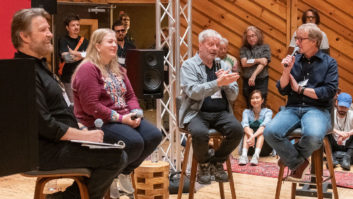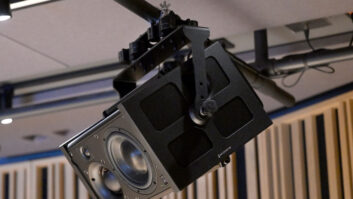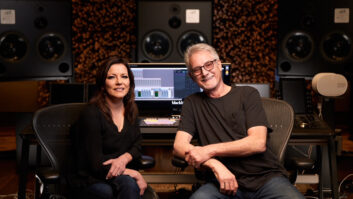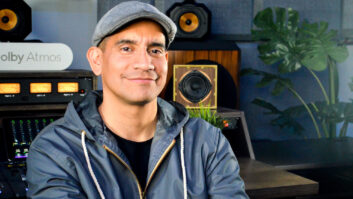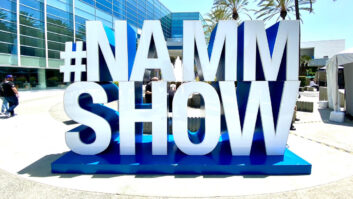
This month, I am recovering from the blurry haze that could only result from end-of-quarter finals—late nights of wrapping up class projects, grading papers, entering grades and trying to get back on a regular sleep schedule. You’d think I was a student, hence this month’s stream-of-consciousness thread that includes random thoughts about the education process, links of interest and a few sample “student and reader questions” that have nudged me to do more surfing. Some examples:
Q: I am a student at ______. I read your article about _____. For my class project, I want to build a particle accelerator. Can you help me?
The above question is only slightly exaggerated; I help where I can.
Q: If I study electronics, will I be able to design my own console?
Dear Overly Ambitious. Buy a used console, make it work and then modify to taste.
Q: What should I study so that after school I’ll be able to get a job?
A skill that few others have. If you go to an audio school, take the technical classes. Learn how to solder, make cables, use a multimeter, troubleshoot.
Q: Can you help me fix this [insert fave squirrelly device here] over the phone?
The first Q&A is free. The others require a consultant’s fee.
Of course, education is different for everyone. The traditional “right out of high school” plan doesn’t work for everyone, as in, “may not be the most efficient use of cash.” In my experience, the most ready students are generally a few years past high school and/or have tinkering experience and come with the necessary drive and questions. For some, college is a way to sample the options and figure out a direction from there.
That said, I do occasionally get questions that are overly ambitious and for which there are no simple answers. It may seem repetitive, but with the right mix of drive, tenacity and patience, the craziest ideas and accidents can become reality. Don’t give up! For almost every question there are at least a few links on the subject to get started—often with pictures or schematics or videos. Some very generous people—our modern virtual mentors—gladly take us from an idea or observation all the way through to a proof of theory or functioning prototype.
I am continually impressed with Wikipedia’s growth and depth (more info each visit). It may surprise some that I often have to remind students not only what an incredible resource the Web is, but also the importance of seeking out more than one version of The Truth, be it technical, political or culinary. Audio electronics is a multi-disciplinary “distraction” that ranges from pure science to art to politics, as in highly opinionated versions of the audio truth.
Because each student’s mind is wired differently, it may take several perspectives before the dots start connecting. After sharing a few sample links, I love it when students get the fever and reciprocate, sharing that “light bulb” (now LED) explanation. Here, for the much broader Mix audience, are some of the resources I point my students to:
10000cows.com
I have always been impressed with Dale Ulan at 10,000cows in Alberta. In addition to his many diverse interests, he always seems to be able to find—or build—the necessary equipment to turn his ideas into a tangible reality, whether microphone capsules (from scratch) or electric cars. He attributes much of his curiosity and drive to a reverse-engineering obsession that began, for him, at about age 3. It’s an Asperger’s trait, he says, and it gives him the ability to concentrate on a goal like a dog with a bone. The flip side, he continues, is that his Asperger removes “probably 30 percent of my emotional wiring” in exchange for what is often called “the engineer’s disease.”
youtube.com/watch?v=cvtjHhtxmpI
Not only D.I.Y. peeps like Dale share their lair, even Neumann divulges a few of its U87 factory secrets in this how-to video.
store.curiousinventor.com/guides/Surface_Mount_Soldering/101
The size and simplicity of vacuum tube and vintage solid-state circuitry qualify them as easy-to-learn, entry-level technology. From parts recognition to soldering and eventually the ability to parse the schematic, it’s no wonder the retro-resurgence is still going strong 20-plus years later. Eventually, we must all submit to the surface-mount technology mistress. My fave video shows how to remove and replace with conventional soldering equipment.
afrotechmods.com
The “new geek on the block” is AfroTechMods.com. Many concepts are explored in an informative yet humorous manner. Thanks to John Kargol, my current assistant and former student, who forwarded this link.
In fact, I’m continually learning from students, which in turn makes me a better teacher. I asked John to comment on the flip side, on what it’s like to be a student who has questions. He says: “Electronics class was more than a challenge for me. Sure, I’d taken things apart before, but only with a vague mechanical understanding, nothing more. Entry-level fluency, like the terminology and the relating of schematics to hardware—especially when the two don’t match—was quite a bit of work. And the math, while not terribly difficult at this level, still requires that you train yourself to think in that language.
“The most difficult and the most unsettling part of having a single 10-week electronics class is that I had to accept the idea that something happens without really knowing how or why. The problem, in the beginning, is that it can be difficult to know which questions to ask. In a multi-disciplinary art, even the starting point assumes a basic knowledge in the fundamentals, like physics and chemistry.
“Utilizing multiple resources outside of class should be a mandatory exercise, if only to force students to see how advantageous it is to hear something twice, in a slightly different way, and in a pause-able and replayable medium. I often found myself, or still find myself, reviewing the fundamentals when a source, with any decent amount of ethos, wants to share. In the same way that we may miss a less-than-obvious element in a music arrangement, we can certainly miss a detail in this field. The power of reiteration could turn on a lot of lights, or just one, but as long as it’s an active pursuit, there is always more to learn.”
I couldn’t have said it better myself. It would be great if education were as simple as cut-and-paste, or the Vulcan Mind Meld. Lectures work well, especially when telling a story like history! That said, there is a chicken-and-egg relationship wedged in between hands-on experience and the math that explains the physical sciences. Students from kindergarten to college come to life with hands-on labs—their motivation, passion and determination transcend any mathematical shortcomings. The satisfaction of making stuff work is the foundation of the learning process; it builds confidence.

